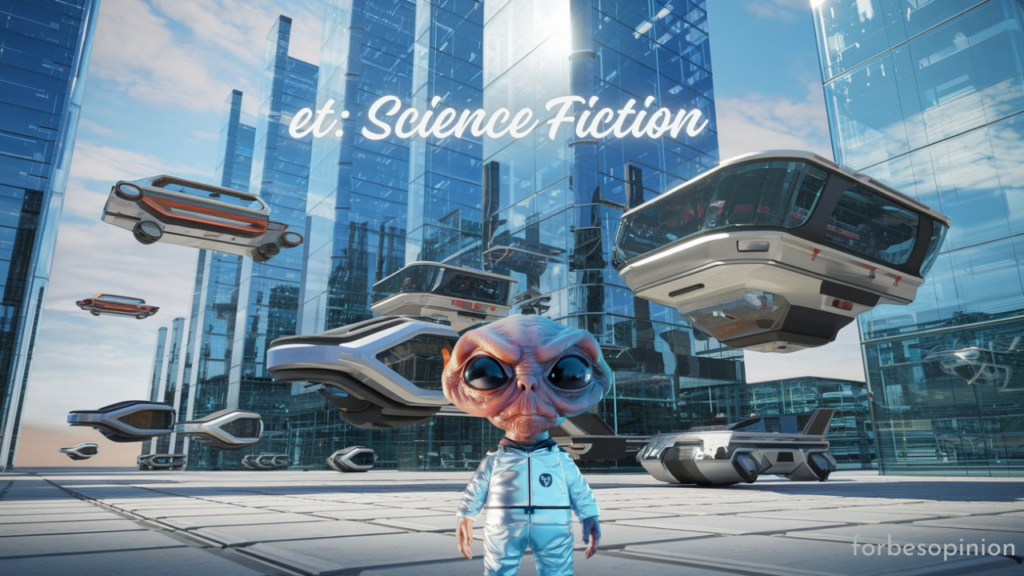
ET: Science Fiction In the vast universe of imagination, et: Science Fiction stands as a cornerstone, capturing the attention of curious minds for generations. The idea of extraterrestrial beings, often abbreviated as “ET,” has long intrigued both the public and the scientific community. This fascination has shaped countless stories, inspiring deep thoughts about life beyond Earth. But why has ET become such a central figure in science fiction? And what exactly makes the concept so captivating?
What is ET?
The term “ET” is short for “Extra-Terrestrial,” which refers to any life form that does not originate from Earth. In the realm of et: Science Fiction, this idea extends far beyond simple organisms. ET often represents intelligent beings, capable of advanced technology, communication, and sometimes, world-altering interactions. This concept ignites the imagination, leading many to wonder about the nature of these beings—are they friendly explorers or menacing invaders?

ET in Popular Culture
The portrayal of ET in popular culture has been diverse, ranging from friendly visitors to hostile invaders. One of the most iconic depictions is in the 1982 movie E.T. the Extra-Terrestrial, where a gentle alien forms a heartwarming bond with a young boy. This film captured the public’s imagination, offering a hopeful and emotional take on what extraterrestrial life might be like.
On the other end of the spectrum, shows like The X-Files present a more mysterious and sometimes terrifying vision of ET. In this series, FBI agents investigate strange phenomena, including alien encounters and abductions, creating a darker narrative around extraterrestrial beings. The duality of these portrayals—ET as both friend and foe—adds to the richness of et: Science Fiction, making it a genre ripe with endless possibilities.

Why Are We So Obsessed with ET?
The obsession with ET in science fiction reflects humanity’s deep-rooted curiosity about the unknown. The idea that we might not be alone in the universe is both thrilling and unsettling. It challenges our understanding of existence, urging us to look beyond the confines of our planet. The notion of extraterrestrial intelligence opens up questions about our place in the cosmos: If intelligent life exists elsewhere, what could we learn from them? How would their presence impact our world, our beliefs, and our future?
These questions form the backbone of et: Science Fiction. By exploring these possibilities, writers, filmmakers, and scientists alike dive into uncharted territories of thought. Whether it’s the fear of an alien invasion or the hope of peaceful communication, the idea of ET serves as a mirror for our own aspirations and anxieties.

The Evolution of ET in Science Fiction
The role of ET in science fiction has evolved over the years. Early depictions often portrayed extraterrestrial beings as monstrous or evil, serving as a metaphor for Cold War fears or anxieties about technological advancements. Films like The Day the Earth Stood Still (1951) used aliens as a way to explore human fears of nuclear destruction and war.
As society’s understanding of science and space exploration grew, the portrayal of ET became more nuanced. Contact (1997), based on Carl Sagan’s novel, delves into the scientific pursuit of extraterrestrial intelligence and explores the emotional and philosophical implications of making first contact. Rather than focusing on alien threats, this film presents a thoughtful and realistic portrayal of how humanity might respond to discovering we are not alone in the universe.
Also Read: Windows 10 Pro Product Key
In more modern et: Science Fiction, extraterrestrials often embody the fears and hopes of the time. Whether they represent the potential consequences of climate change, genetic engineering, or the rise of artificial intelligence, ET often serves as a stand-in for our anxieties about the future. This flexibility makes the concept of ET endlessly adaptable to the concerns of any given era.

UFOs and the Search for ET
Beyond fiction, the search for extraterrestrial life has captured the scientific community’s interest as well. The study of UFOs (Unidentified Flying Objects) often crosses paths with the world of et: Science Fiction, blurring the lines between imagination and possibility. While the existence of intelligent extraterrestrial beings remains unproven, sightings of UFOs continue to spark debates, investigations, and speculation.
Efforts like the Search for Extraterrestrial Intelligence (SETI) focus on detecting signals from space that might indicate the presence of other intelligent life forms. While no definitive evidence has been found, the search continues, driven by the same curiosity that fuels et: Science Fiction. Could an alien civilization be trying to reach out to us? Or are we simply looking for something that may not exist? These are questions that keep both scientists and science fiction writers engaged.

The Ethics of ET
The question of ET’s existence also brings up ethical considerations. If we were to make contact with extraterrestrial beings, how would we treat them? Would we see them as equals, or would our own biases and fears lead to conflict? et: Science Fiction often grapples with these moral dilemmas, offering scenarios where humanity must confront its own prejudices and values when faced with the unknown.
In films like Arrival (2016), the arrival of extraterrestrial beings prompts humanity to reconsider communication, cooperation, and even the concept of time. The film highlights the challenges and opportunities that first contact might present, urging viewers to think about how we approach the unfamiliar.

Conclusion: Why ET Endures in Science Fiction
Et: Science Fiction continues to be a genre that both entertains and provokes thought. The concept of ET allows writers and filmmakers to explore complex ideas about the future, the unknown, and what it means to be human. Whether portrayed as a friend, foe, or something entirely different, ET remains a fascinating and versatile figure in the world of science fiction.
As we look to the stars and wonder if we are alone, the stories we tell about ET will undoubtedly continue to evolve. Each new depiction of extraterrestrial life reflects our changing understanding of science, our hopes for the future, and our deepest fears. This is why et: Science Fiction will remain a relevant and compelling genre for years to come.
The next time you watch a movie or read a book about ET, remember that these stories are more than just entertainment. They are an exploration of the possibilities that lie beyond our world, a reflection of our own humanity, and a testament to the enduring power of imagination.

Bsst Hindi News || बिजनेस न्यूज हिन्दी